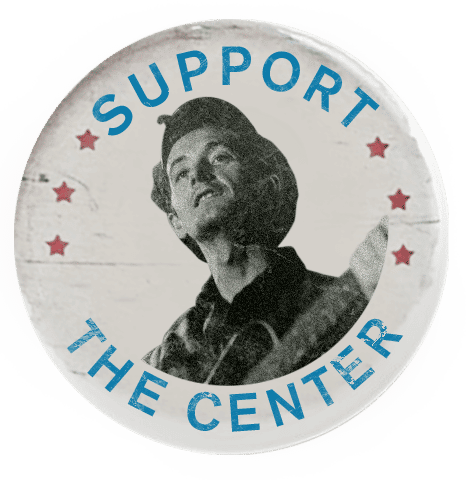Collection Title:
The Izzy Young Folklore Center Library Collection
Online Catalog:
The books and periodicals in this collection are cataloged online at this link
Collection Number:
2019-019
Collection Processed and Cataloged By:
Grace Asher and Grace Stroud
Collection Guide Prepared By:
Grace Asher, Mark Davidson, Stephanie Stewart, Grace Stroud
Collection Date Range:
1732-2019 [bulk 1950s-1980s]
Collection Extent:
1,837 books, periodicals, and concert programs (64 linear feet)
Collection Provenance:
Philomène Grandin (Izzy Young’s daughter)
Biographical Sketch:
Israel Goodman Young (1928–2019), known as Izzy Young, was a business owner, social activist, and central figure in the Greenwich Village folk music scene. Izzy Young was born on March 26, 1928, on the Lower East Side of Manhattan to Philip and Pola, Jewish immigrants from Łódź, Poland. In the 1950s, after studying at Brooklyn College, Young worked in his father’s bakery in Borough Park, Brooklyn. He developed an interest in folk music and folk dancing as a member of Margot Mayo’s American Square Dance Group and was further inspired by folklorist and music producer Kenneth Goldstein to turn this interest into a committed pursuit. Young opened the Folklore Center in Greenwich Village in 1957, a music store and central hub for books, sheet music, records, instruments, folk concerts, poetry readings, and congregating folk performers and enthusiasts. In the early 1960s, Young also co-founded the Friends of Old Time Music, a group that hosted inaugural concerts by Doc Watson and Roscoe Holcomb, among others, and reintroduced New York audiences to musicians Dock Boggs and Mississippi John Hurt—absent from the New York scene since the 1920s. Young arranged Bob Dylan’s first formal concert at Carnegie Hall in 1961, as well as performances by Dave Van Ronk, Phil Ochs, and Joni Mitchell. Young also organized a protest in 1961 after the New York City parks department banned folk music in Washington Square Park. Known as the “folk riot” or “beatnik riot,” the protest helped secure the return of folk music to the park a few weeks after the initial demonstrations. Young wrote a column called “Frets and Frails” for the magazine Sing Out! from 1959–1969. In 1973, pursuing an interest in Swedish folk music, he passed the Folklore Center onto Rick Altman and moved to Stockholm, Sweden. There he opened the Folklore Centrum, modeled on its U.S. counterpart but featuring performances by Scandinavian and international folk artists. After four decades of activity, the Folklore Centrum closed in 2018 due to Young’s age. Young died on February 4, 2019, at the age of 90 in Stockholm.
Scope and Contents:
The Izzy Young Folklore Center Library collection consists of books and other materials on the subjects of musicology, ethnomusicology, dance, instrumental method, sociology, history, New York, Jewish music and culture, and folklore and folklife. The collection includes concert programs, songbooks, music and dance instruction guides, literary journals and reviews, and music magazines. In addition, the collection contains books, vinyl LPs, and CDs by and about Bob Dylan as well as books on other artists including Woody Guthrie, Joan Baez, Bruce Springsteen, Judy Collins, Janis Joplin, Leadbelly, Jelly Roll Morton, and Phil Ochs. Several books contain handwritten annotations by Izzy Young, voicing his thoughts and opinions about the authors and their work.
Musical genres included in the collection are folk, blues, jazz, R&B/rock, sea shanties, minstrel, and Cajun. The songbooks feature American folk, Canadian, Irish, UK, Scottish, World, blues, country/cowboy, jazz, popular, rock, and women’s liberation songs.
The materials on dance include African, American, European, and United Kingdom and cover contras, square dancing, country/cowboy, folk, blues, and jazz. There are also manuals and guides for dance teachers and callers.
There are instrumental method books for bagpipe, banjo, mandolin, bodhran, dulcimer, fiddle, flute, guitar, harmonica, Irish harp, steel guitar, tabla bols, percussion instruments, and tin whistle.
Related Materials:
Izzy Young collection, 1942–2016, American Folklife Center, Library of Congress
Language:
English, French, German, Japanese, Spanish, Swedish, Vietnamese [bulk English, Swedish]
Collection Restrictions:
The Izzy Young book collection is available for in-person, onsite research at the Woody Guthrie Center
Arrangement:
Books arranged on shelves according to the Library of Congress Classification System

